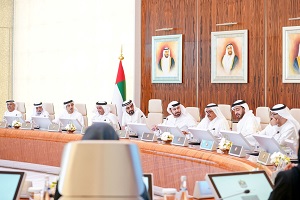Media Center
UAE Cabinet approves National Strategy for Wellbeing 2031
The UAE Cabinet, chaired by His Highness Sheikh Mohammed bin Rashid Al Maktoum, Vice President, Prime Minister and Ruler of Dubai, adopted the National Strategy for Wellbeing 2031 during its meeting at the Presidential Palace in Abu Dhabi.
The Cabinet meeting was attended by H.H. Lt. General Sheikh Saif bin Zayed Al Nahyan, Deputy Prime Minister and Minister of the Interior, and H.H. Sheikh Mansour bin Zayed Al Nahyan, Deputy Prime Minister and Minister of Presidential Affairs.
The National Strategy for Wellbeing 2031 aims to make the UAE a world leader in quality of life through a number of strategic objectives and initiatives. It also aims to promote an integrated concept of wellbeing, thus supporting the vision of the UAE Vision 2021 and the UAE Centennial 2071.
The Strategy is based on a national framework of three main levels - individuals, society and the country.
It includes 14 components and nine strategic objectives, which include enhancing people's wellbeing by promoting healthy and active lifestyles, promoting good mental health and adopting positive thinking.
The Strategy includes 90 supporting initiatives targeting more than 40 priority areas. One of the most important initiatives is the development of the first 'National Wellbeing Observatory' to support the policymaking process.
It will monitor a number of indicators of wellbeing in the UAE, submit regular reports to the UAE Cabinet, propose training programmes for government employees, and launch of the Academy of Wellbeing future generations, in addition to the formation of a National Wellbeing Council to manage and coordinate the national strategy.
The Cabinet also adopted a number of federal decisions and laws including the adoption of amendments to the Federal Law on the Regulation and Protection of Industrial Property of Patents and Industrial Designs.
The amendments aimed at providing an integrated legislative environment regulating industrial property rights and protecting the rights of inventors.
The decision reflects positively on the national economy and supports its transformation into a knowledge-based innovative economy.
It adopted the Federal Law on Biosafety of Genetically Modified Organisms, which aims to protect public health from the risks of genetically modified organisms or their products. It also ensures the protection of the environment in the development, manufacture, production, transfer or circulation of genetically modified organisms or their products.
These technologies are globally used in several fields, including the production of agricultural crops and food, as well as the control of agricultural pests.
The Cabinet also adopted the executive regulations of the Federal Law on Medical Liability, which defines the conditions and standards of health facilities and the level of health services.
Concerning international relations, the Cabinet adopted and ratified a number of international conventions, including ratification of the UAE’s accession to the International Alliance for Green Development along the Belt and Road initiative, as well as an agreement between the Government of the UAE and the Government of Peru on the mutual exemption of visa requirements for holders of diplomatic and private passports.
Agreements with Korea and Peru on the elimination of double taxation in respect of income taxes were also ratified, along with an agreement with Gabon on mutual encouragement and protection of investments, and an agreement with Uzbekistan on administrative cooperation and exchange of customs matters.
The Cabinet also approved an agreement with Honduras on air services between and beyond their territory, as well as membership in the Multilateral Organisations Performance Assessment Network.


